Wheat is the only nutritious food that Mohamed Aldreini can afford to feed his 22-month-old daughter, Rewan.
The Palestinian toddler has never tasted breast milk since she was born in November 2023, a month after Israel’s genocide in Gaza began.
Rewan’s mother, who now cares for four children, is battling depression. Her body stopped producing milk after repeated trauma caused by Israel’s relentless siege and bombardment.
The family was forced to flee their home in Beit Lahia, northern Gaza Strip first to Gaza City, then to Khan Younis.
Also Read: Palestinians in Gaza Remain Wary Amid Ceasefire Jubilation
“These events led to Rewan’s mother being diagnosed with PTSD,” Aldreini told Middle East Eye (MEE), while his wife boiled a small pot of rice to prepare milk-free rice pudding for their daughter.
Rewan has inherited her mother’s frailty.
She cannot walk, can barely speak, and suffers from a weakened immune system, heart problems, and severe malnutrition.
Her weight continues to drop and now stands at only 7 kilograms.
Her health is deteriorating due to what her father describes as “engineered starvation” imposed by Israel on the Gaza Strip.
Aldreini believes Rewan could survive the hunger “if she received better nutrition and the war stopped.”
Also Read: When the Sumud Flotilla Didn’t Reach Gaza
However, genetic researchers warn that even if she survives, Rewan will likely face long-term health complications — not only for herself, but potentially for her future children as well.
Historical Evidence
Over the past two decades, studies of historical famine and trauma from the Holocaust to the Great Chinese Famine and the Rwandan genocide have shown that such suffering leaves lasting genetic marks.
While hunger, stress, and trauma do not alter DNA sequences, they leave chemical changes that affect how genes are expressed without changing the underlying code.
This process, known as epigenetics, allows the burden of war to be passed down through generations.
Also Read: Noble Effort in Caring Senior Citizen; Best Practices from Indonesia to the World
During the Nazi occupation, food supplies were cut off from western Netherlands between 1944 and 1945, causing widespread starvation.
Decades later, researchers found that children born to mothers exposed to famine during pregnancy faced higher risks of serious health problems later in life.
“Studies show that stress hormones in mothers affect the baby’s body and brain,” said Professor Tessa Roseboom, a biologist at the University of Amsterdam who leads research on the genetic impact of the Dutch famine.
“We have also studied how fathers living under unsafe, stressful, and malnourished conditions influence their babies,” she added.
Also Read: Open Letter to President Prabowo Subianto: Never Recognize the Sovereignty of Zionist Israel
In 2015, a landmark study led by Rachel Yehuda focused on 32 Holocaust survivors and their children, finding evidence of epigenetic inheritance of stress.
“The genetic changes observed in the children could only be linked to their parents’ exposure to the Holocaust,” Yehuda explained.
A Double Burden in Gaza
Due to Israel’s ongoing blockade, no direct studies on epigenetic markers in Gaza have yet been conducted.
However, scientists have drawn clear parallels with cases from the Netherlands, China, and among Jewish Holocaust survivors.
Also Read: Measuring the Reality of the Israel-Palestine Two-State Solution
“In Gaza, the current conditions are so dangerous that they could cause long-term damage to the health of children and future generations even if peace were to be achieved soon,” Roseboom told MEE.
Dr. Leon Mutesa, a leading researcher at the University of Rwanda who studies the genetic legacy of the 1994 genocide, shared a similar view.
“In Gaza, we are already seeing symptoms — fear, stress, and high cholesterol levels, all early indicators of forthcoming epigenetic changes, similar to those observed in Rwanda,” Mutesa told MEE.
Research in Rwanda began after it was discovered that children born during the genocide carried the psychological burden of their mothers’ trauma, he explained.
Also Read: Tunisian Man Donates Boat to Global Sumud Flotilla, Citing “Gaza Is Worth More Than Anything”
This manifested in depression, anxiety, bipolar disorder, hallucinations, and other mental illnesses.
“In war zones like Gaza, the impact is multiplied,” he added.
“Layers of additional suffering hunger, displacement, and ongoing violence, intensify the collective trauma. These conditions leave deeper negative epigenetic imprints.”
According to Palestinian health officials, Israeli forces have killed at least 20,000 children since the war in Gaza began two years ago.
UNICEF reports that more than 50,000 children have been killed or injured.
Also Read: The Sunnah of Eclipse Prayer: A Step-by-Step Guide
In August alone, 12,800 children were identified as suffering from acute malnutrition, in what the United Nations confirmed as an undeniable famine disaster.
These conditions are likely to leave severe and lasting epigenetic damage.
“I am convinced the people of Gaza will suffer catastrophic effects, perhaps even more severe than those documented in previous atrocities,” said Professor Hassan Khatib, an epigenetics expert at the University of Wisconsin–Madison.
“There is no doubt that a genetic catastrophe awaits the people of Gaza, especially pregnant women and adolescent boys during puberty, a critical stage of sperm development,” he warned.
Also Read: Reflecting on Road Engineering: An Effort Toward Driving Safety
Khatib noted that recent studies on sheep show that a father’s diet can affect traits such as muscle growth and disease risk, with effects passed down for two generations.
“What is happening now will result in a future disaster that we will witness among generations growing up in Gaza,” he said.
“The Gaza Strip is experiencing multiple complex factors exerting severe negative pressures on its people.”
One Clear Solution
After reviewing Rewan’s case and her family’s medical history, specialists concluded that she faces a much higher risk of serious health complications due to epigenetic effects, consistent with findings from previous studies.
“It’s clear this child isn’t receiving the essential nutrients needed for her development,” Roseboom said.
“That will likely affect her metabolism and make her more vulnerable to diabetes or heart disease.”
Also Read: Stop the War Now
Dr. Mutesa agreed.
“Rewan’s genes are being altered by war and starvation. She and her future children will suffer the consequences,” he warned.
Studies point to one clear solution to the looming crisis: “End the war,” Mutesa said.
“We observed that some Rwandans exposed to the genocide began to recover once the violence ended and support was provided,” he added.
Research also shows that lifestyle and environment play a crucial role in influencing epigenetic markers. In other words, positive changes, safe living conditions, food security, healthcare, and psychological support can help repair some of the damage.
Also Read: From Indonesia’s Zero Point, Three Muslim Women Raise a Flag and a Call for Humanity for Palestine
“We need action from the international community to end the suffering in Gaza,” Roseboom urged.
“This conflict is not only about the present. It is creating lifelong consequences for children like Rewan and potentially for generations to come,” she said.
Although much of the damage may be irreversible for some, scientists agree that many effects can still be prevented if proper support is provided.
Safety, medical care, nutrition, and social stability are key to saving the lives of Rewan and countless other children like her in Gaza.
“As I watch my children’s health deteriorate, while my wife and I struggle with diabetes and high blood pressure, I still dare to dream that this genocide will end,” said Rewan’s father, Aldreini.
“That we can return to a normal life as human beings.”
Mi’raj News Agency (MINA)





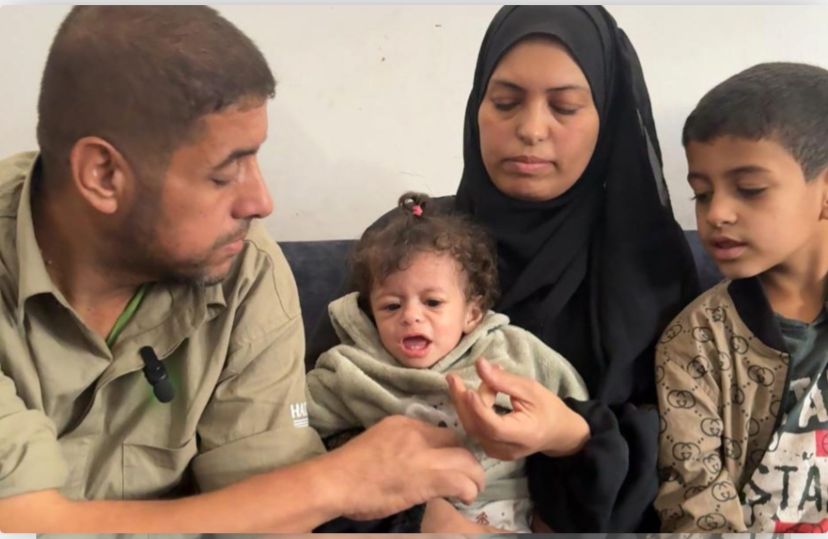



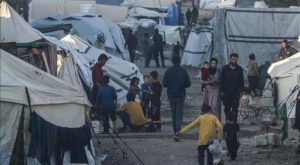


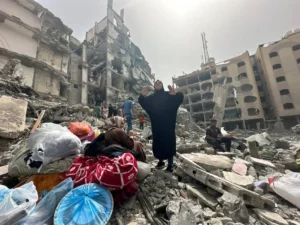


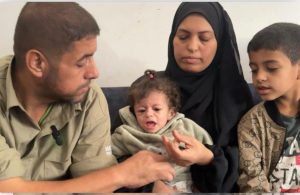








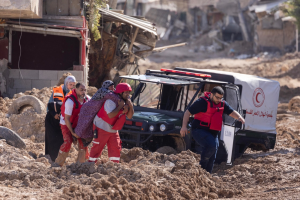
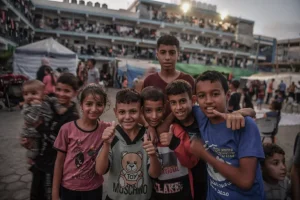






 Mina Indonesia
Mina Indonesia Mina Arabic
Mina Arabic